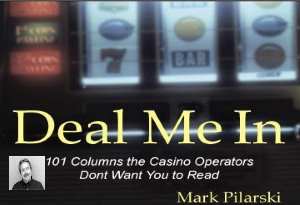Every time I leave a blackjack game, the dealer always asks if I want to “color up.” What is the reasoning behind him or her asking me this? J.T.
The casino encourages players to color-up when leaving a table game for one of three reasons. The first is for the player’s convenience, as it makes a player less likely to drop chips all over the floor on the way to the cashier’s cage. There is nothing more entertaining than the ensuing free-for-all when a sizable lot of $25 chips hits the floor.
Then there is the table that might be short of the very chips you are taking off the game. Coloring up saves them the time and energy of getting a fill. Most importantly though, if lets the casino know exactly how much a player has won or lost.
A tip to conceal your winnings is to throw a little pepper on the trail by covertly pocketing some of your chips. This is an effective way of camouflaging your spoils.
If splitting pairs is an offensive move, why would splitting 8s against a 10 be considered offensive? Jeff J.
Splitting pairs can be either an offense or a defense of move depending on the pair you are splitting, and/or the dealer’s up-card. You split to win more when the dealer has a bust card showing, and split to lose less when splitting can turn a particularly poor hand into a potential winner, such as a pair eights.
Everyone has heard it before, always split eights (and Aces), and here is the reason why. Blackjack is a game where the correct hit, stand, doubling and splitting decisions are necessary in order minimize the casino advantage on your play. These proper decisions are called basic strategy and have been arrived at by computer simulations of millions of hands. The objective of pair splitting over standing or hitting is to either win more or lose less over the long run.
You’re not alone, Jeff, in that plenty of players get apprehensive coming out of pocket with additional ka-ching with 8s against a face, but the key behind basic strategy is this: Win more money, not necessarily more hands. With your scenario, when the dealer shows a ten, playing two hands, each starting with an eight, is better than playing one hand beginning with 16.
The reason being, Jeff, is that you will lose more money in the long run if you were to hit, instead of split. Mathematically, when you just hit this hand, you will lose $51 for every $100 wagered. However, if you split, you will lose $44 for every $100 bet when you split eights. This seven-dollar difference for every hundred dollars wagered adds up.
By the way, Jeff, there is one lone exception to the splitting 8s rule: If the dealer hits soft 17, and surrender is offered, surrender the pair of 8s if the dealer shows an Ace.
Gambling Wisdom of the Week: “The first step into learning the game of blackjack is to master the rules.” —Edward O Thorp, Beat the Dealer




















